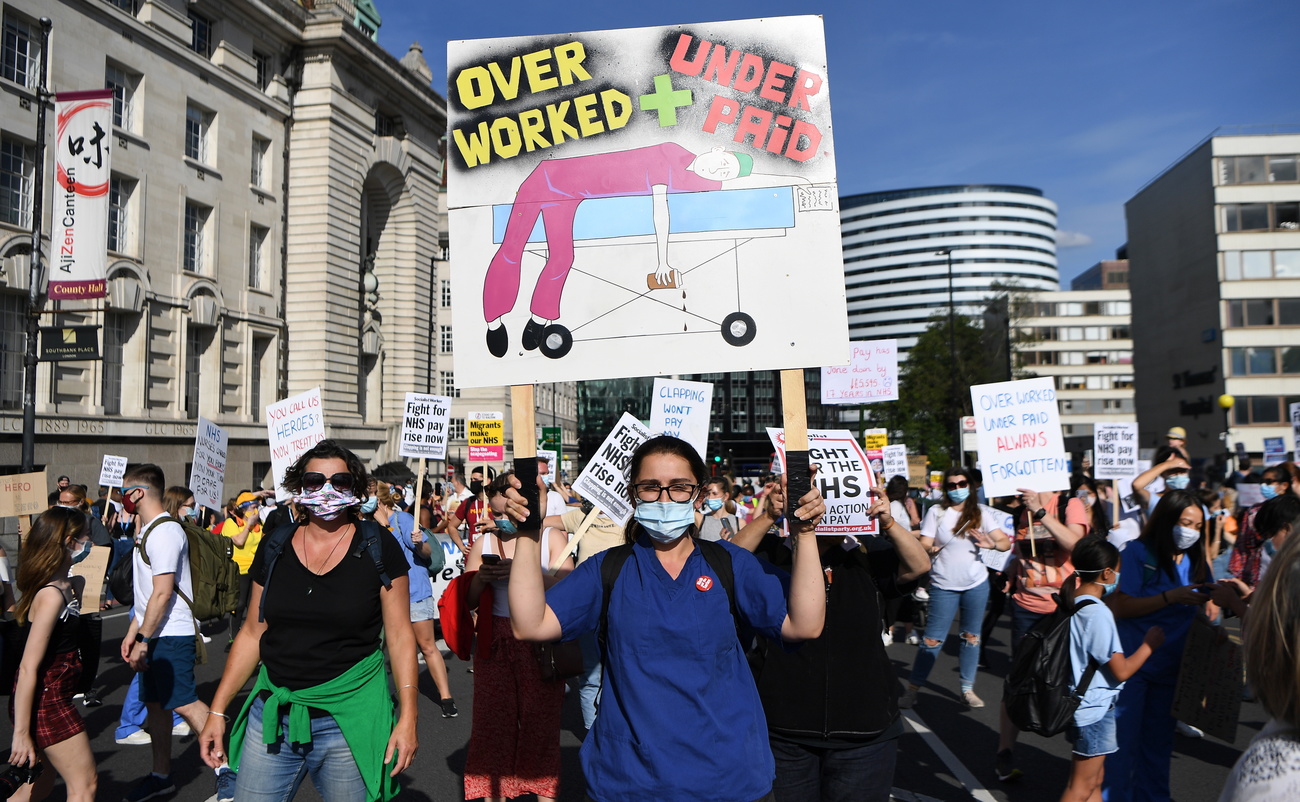
Nurses around the world take to the streets

After giving their all for months to cushion the blow of Covid-19, nurses around the world are demanding better working conditions. Demonstrations are also planned in Switzerland, where parliament is balking at taking steps to improve the long-term situation for nursing staff.
In the United States, New Zealand, France, Peru and Zimbabwe, nurses are downing tools to demand better working conditions. The coronavirus pandemic has thrown the spotlight on the difficult daily lives of careworkers, who are often understaffed, poorly paid and little recognised. The extreme situation lived by nurses in recent months has given new impetus to demands that have been on the table for decades.
In Switzerland, too, the movement is gaining momentum: associations and trade unions have joined forces to set up an alliance of healthcare professions. A week of protests is scheduled for the end of October, followed by a demonstration in front of the federal parliament in Bern on October 31.

More
Nurses in Switzerland: stressed out and underpaid
Cautious reaction by parliament
Parliament is currently debating the popular initiative “For strong nursing care”, which was submitted by the Swiss Nurses’ Association in 2017. The government is calling on voters to reject this text, but it is putting forward an indirect counterproposal, which aims to achieve some of the goals of the initiative: to promote training and give more responsibilities to nursing professionals.
Parliament’s two chambers are hammering out the details of the counterproposal, in particular regarding the obligation for cantons to provide financial assistance to young people in education and reimbursement by the basic health insurance of services provided independently by nurses.
However, the Swiss Nurses’ Association regrets that parliament’s draft does not include measures to ensure that staffing keeps pace with needs and to improve working conditions, at a time when 46% of nurses abandon the profession, according to a study by the Swiss Health Observatory – the highest rate among professionals in the health sector.
A good student, but…
While many Swiss statistics are encouraging when compared internationally – for instance, the country has one of the highest per-capita ratios of nurses and new graduates – there are some worrying indicators. According to the latest Health at a Glance report by the Organisation for Economic Co-operation and Development (OECD), published in 2019, nurses’ pay when compared with the average Swiss salary is among the lowest in the OECD.
Switzerland also ranks second among the countries that rely most on nurses trained abroad, with a proportion of 25%. In addition, according to figures from the Federal Statistical Office, 36% of hospital careworkers are not Swiss: 13% are German, 12% French and 3% Italian.
This dependence on foreign professionals, in particular cross-border workers, came to the fore during the pandemic. When states closed their borders to limit the spread of Covid-19, Switzerland had to negotiate with its neighbours to allow the continued movement of health personnel so that its hospitals could keep working properly.
This situation persists with the new wave of infections and quarantine imposed on anyone entering Switzerland from a region at risk. The government has put certain French departments on its red list, while clearly stating that exceptions will be made for border areas.
Tense situation on the ground
An international study carried out in 2012 shows that Swiss nurses are on the whole satisfied with their working environment compared with other European countries; they also suffer less from mental fatigue.
But according to an survey conducted among Swiss careworkers by the trade union Unia at the end of 2019, 90% of respondents felt that they were working under pressure and 87% considered that they did not have enough time to devote to their patients. A majority said that they had to work double shifts without the requisite rest breaks and that they didn’t have enough time to dedicate to their families and leisure activities.
Meanwhile, personal accounts gathered during swissinfo.ch’s inquiry into the daily lives of nurses in Switzerland confirm that they are stressed, overworked and pinched for time to spend with their patients. Those interviewed also complained about pressure from their superiors and a lack of regard for nursing staff.
“To ensure good nursing care in the future, we need to have enough staff and good framework conditions,” stresses Sophie Ley, president of the Swiss Nurses’ Association. “A training campaign will not suffice if nearly half of them then quit the profession.”

More
Overwhelming, lonely and stressful – life in the Covid-19 unit in Geneva

In compliance with the JTI standards
More: SWI swissinfo.ch certified by the Journalism Trust Initiative


























Join the conversation!